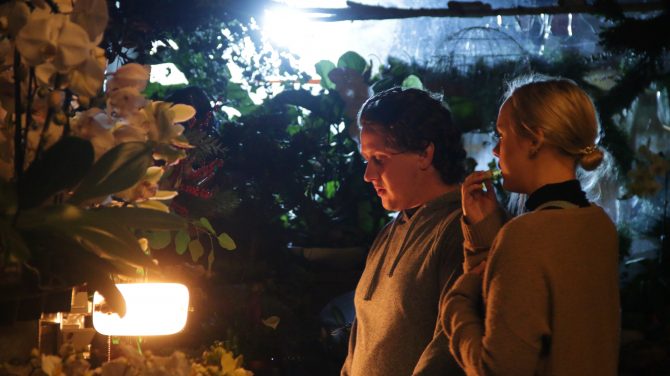TFS Grad Darcy Love Talks Book-To-Screen Adaptations On World Book Day
How do you adapt 1,861 words written by the undisputed King of Horror into an award-winning five minutes of cinema?
Australian-Canadian filmmaker Darcy Love recently found out the answer to that question over the final nine months of his studies at Toronto Film School. A long-time Stephen King fan, the 24-year-old director opted to tackle King’s The Man Who Loved Flowers as the capstone project to his 18-month Film Production Diploma at TFS.
“I’d never done an adaptation before, and foolishly thought it would be easier than writing something from scratch…which wasn’t the case,” he laughed, noting that he quickly learned that translating stories from the pages of a book onto the live-action screen comes with its own set of challenges.

For one, print narratives don’t always project well onto the big screen, so filmmakers working on screenplay adaptations are oftentimes tasked with distilling meaning from their source materials, then taking certain liberties to ensure the crux of that message is projected onto the screen.
“You always want to stay as close to the source material as you can, but the key to adapting, I think, is finding the essence of a story and running with that,” Love said.
With The Man Who Loved Flowers – the twisted tale of a handsome young man with a secret past, a penchant for roses, and a certain knack for wielding a hammer – one of the roadblocks Love had to overcome was King’s use of third-person narration to unveil the hidden details of the man’s history and motives.
“There was a big portion of the story at the end in which Stephen King kind of explained a lot of the background story just to the audience…but we couldn’t do that in the film, because movies are always ‘show, don’t tell,’” Love said.
Instead, Love made the choice to book-end his screen adaptation with an off-script set of phone calls between the man and the voicemail of his long-lost love to fill in some of the background gaps.

Another challenge Love had to manoeuvre in his adaptation of King’s circa 1977 short story was modernizing it for today’s viewing audiences.
In one scene in particular, the titular character in King’s original version of The Man Who Loved Flowers approaches an unknown, yet a smiling woman in a darkened laneway and is able to get close enough to gift her with a small bouquet.
“The original story was written in the ’70s, when it might not have been weird for a man to have followed a girl down an alley and for her to let him walk all the way up to her – but that’s just really unrealistic now,” Love said of his decision to alter the screenplay to reflect a previously existing connection between the two characters, in order to better explain the encounter in light of today’s realities.
“We also kind of set their meeting in a park, which was still kind of secluded, but felt like a more realistic place for these two people to meet.”
While Love deemed making such changes necessary to the adaptation process, that didn’t mean he wasn’t nervous about the reactions of die-hard King fans amongst his film’s audiences at the seven film festivals The Man Who Loved Flowers has so far been screened at.
“I’m a huge Stephen King fan myself, so I wanted to do a good job as a fan – but you also don’t know how other fans are going to take it, because we did take some liberties,” he said, noting that there were many a Stephen King devotee among the audiences at the film festivals his short was screened at here in Canada, in the U.S. and beyond.
“When the film was touring the festivals, we had people who knew the story in the audience – so you’re kind of sitting there with your filmmaker badge, hoping no one comes up and tells you they hate what you did with the story. Thankfully that didn’t happen, and it was really well received.”
So well, in fact, that The Man Who Loved Flowers was recognized not once, but twice in less than a week.
The first of the accolades came on Oct. 22, 2018 at the 6ix Screams Festival here in Toronto, where the film walked away with the Warped Act Award for the best death scene. Five days and a 2,700-km westbound flight later, Love was on hand at the Edmonton Festival of Fear to pick up the award for Best Canadian First Short Film on Oct. 27, 2018.
Describing The Man Who Loved Flowers’ success on the festival circuit as “almost indescribable,” Love said the experience has well surpassed all expectations – thanks, in large part, to the hard work of his talented cast and crew.
“I never thought it was going to do as well as it did. I thought maybe we’d be picked up by one or two small festivals and that would be it – and I never thought we’d win any awards for it,” he said, noting that in addition to the two wins, the film was also nominated for a couple of others.
“It’s also one thing to have your peers and teachers say you did a great job, but another to have people you’ve never met before, strangers going out of their way to come up to you after a film festival screening to say they liked it.
“It was just a great feeling and that’s really what I love about the film industry – you get to create something that people enjoy. All that time, all that energy, and all the money you put into it – it makes it all worth it.”
Now a TFS graduate, Love is hoping to use the momentum gained by The Man Who Loved Flowers’ festival success to propel his career forward.
His original script for a new comedy web series, entitled Childcare, was one of just three student projects Toronto Film School submitted to the Telefilm Talent to Watch competition.


